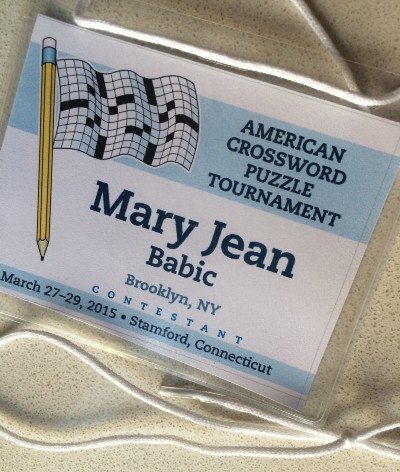 Note from Andy: My pal Mary Jean, who is a former Michigan journalist and a ridiculously fine and funny writer, is attending the American Crossword Puzzle Tournament this weekend. This is her second visit. Last year she chronicled her first visit this way:
Note from Andy: My pal Mary Jean, who is a former Michigan journalist and a ridiculously fine and funny writer, is attending the American Crossword Puzzle Tournament this weekend. This is her second visit. Last year she chronicled her first visit this way:
By Mary Jean Babic
Well, this didn’t bode well.
I had just, with great excitement, received my packet for my first-ever American Crossword Puzzle Tournament and saw that my contestant number was … 13. I then bolted to the bathroom (long drive, big coffee) and entered a stall that presented me with the unflushed effluent of the previous occupant.
I’m not a superstitious person, but this one-two punch made it hard not to think that the universe was telling me that I was an unlucky piece of crap. Or that my puzzle-solving output in the coming twenty-four hours would amount to a giant turd. Or something.
It was just before ten a.m. on Saturday, March 28. My friend Matthew and I had driven that morning from Brooklyn to the very nice Marriott in Stamford, CT, the tournament’s residence since its inception in 1978, save for a seven-year interregnum at the larger Marriott in downtown Brooklyn, a move necessitated by popularity from the 2006 documentary “Wordplay”. (I live only a short subway ride away from the Brooklyn Marriott, yet managed to compete there precisely never.) This year, with the “Wordplay” effect tapering off, the event returned to Stamford. It was a welcome homecoming for many but also the cause of grumbling from some who missed, if not the pricier Brooklyn Marriott itself, New York in general, or had found getting to Stamford to be a pain in the ass.
Even if you hadn’t seen “Wordplay,” simply walking into the Stamford Marriott would leave you with no doubt that you had entered a world unto itself. All around the lobby, people were hunched over crossword puzzles on paper or screens for some final cramming before the tournament’s first official puzzle at eleven o’clock.
Everywhere the purpose of our gathering was broadcast in the form of clothing printed with black-and-white grids. I spotted crossword puzzle T-shirts, crossword puzzle sweaters, crossword puzzle skirts, crossword puzzle shoes, crossword puzzle hats, crossword puzzle ties, crossword puzzle tote bags. I saw a helper dog with a crossword puzzle neckerchief and a man dressed as a crossword puzzle pope, with crossword puzzle mitre, crossword puzzle chasuble, and red shoes. Never before had I been so struck by the fact that whatever else our vocation may be, it’s graphically distinct.
Now, I’m as devoted a cruciverbalist as the next gal. Every day I do, and often complete, the New York Times crossword puzzle, a fact I’ve always been a little quietly smug about. I always knew I would attend this tournament eventually; this was a gathering of my tribe. But, triskaidekaphobia and poop aside, these first moments were daunting. These people purchased and wore crossword puzzle socks. These people, prior to an entire day of doing crossword puzzles, were doing crossword puzzles. These people were, simply, hard core. Suddenly my daily Times feat seemed child’s play rather than serious wordplay.
Not that I expected to finish high at Stamford. I had followed the tournament closely enough to have no illusions on how things went down here. The top finishers were gods. They were whizzing, blistering machines. They were (Matthew’s description) Olympic athletes to our (my description) junior varsity benchwarmers. The highest scorers from previous tournaments had a division all to themselves, mitigating the unfairness of their even solving the same puzzles as the rest of us slobs. All I wanted was a decent showing. There were 575 contestants. I would have been delighted to finish anywhere in the soft middle — the low 300s, say. Surely that was a reasonable goal for someone who does and often completes the New York Times crossword puzzle every day. But within ten minutes of our arrival, I was already downshifting my expectations to, basically, not 575th.
On our drive up, Matthew, a tournament veteran, had given me the lowdown on scoring. Two words: accuracy, speed. Each of the seven puzzles — six on Saturday, one on Sunday morning — has a time limit ranging from fifteen to forty-five minutes, depending on the puzzle’s difficulty. Points are awarded for each correct square, plus more if you complete the puzzle, then more still for each full minute under the time limit that you finish.
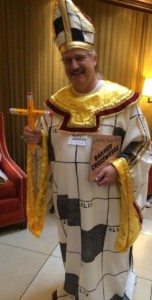 The time factor made me uneasy. I was accurate enough, but I don’t do anything fast, and crosswords are no exception. In the months leading up to this year’s tournament, Matthew had often exhorted me to start timing myself. And I … never had. The online Times puzzle has a built-in clock and everything, but I usually print out the puzzle and do it in my jammies, while drinking coffee and listening to music and, I don’t know, injecting a deadline into that cozy scene felt like a buzzkill, man.
The time factor made me uneasy. I was accurate enough, but I don’t do anything fast, and crosswords are no exception. In the months leading up to this year’s tournament, Matthew had often exhorted me to start timing myself. And I … never had. The online Times puzzle has a built-in clock and everything, but I usually print out the puzzle and do it in my jammies, while drinking coffee and listening to music and, I don’t know, injecting a deadline into that cozy scene felt like a buzzkill, man.
Well, it was too late now. Eleven o’clock was nigh. I joined the herd flowing into the grand ballroom, which was packed end to end with tables draped in light mauve and lined with as many chairs as could humanly fit. Many people were already seated. By the looks of it, the crowd skewed slightly older, somewhat more male than female, and overwhelmingly white. Some people had scattered talismans and tools around their spaces — tiny trolls, plastic figurines, pencils, magnifying glasses — like you see in bingo halls. Matthew had already gone in, so I shoved down his row to wish him good luck. He was not offended that, to keep my self-loathing in check, I preferred to solve among strangers on the other end of the ballroom.
Then he nodded to a spot behind me and said in a low voice, “There’s Will Shortz.”
I spun around. Will Shortz — who sits atop the Mount Olympus of the puzzling world; whom Jon Stewart described in “Wordplay” as Errol Flynn but I saw more as Bob Newhart with a dash of Steve Jobs; who was dressed (thank God) not in crossword apparel but nondescript plaid shirt and khakis — was standing in the aisle chatting politely with some contestants. Will Shortz! Whose name I saw every day perched on the Times crossword, whose calm voice issued clues on NPR’s weekly puzzle segment while I screamed at my husband and kids to keep quiet. There he was, not twenty feet away. Will damn Shortz! I knew, of course, that he would be here — it was histournament — but it still was a thrill to catch sight of him before I’d even taken my seat for the first puzzle. A good omen, this time. Will Shortz.
After a stop at a table to scoop up some well-sharpened pencils, I found a chair on the far side of the ballroom. I usually solve in pen but I knew legibility would matter, so I went for something erasable. Any writing instrument was permitted, as long as it wasn’t green — our puzzles would be scored in green ink.
Volunteers squeezed between the tables, handing out cardboard privacy shields that kept toppling over from drafts and passing butts. I chatted with the gentleman next to me, Eugene, a retired software engineer from Long Island. He showed me a photo of a trophy won by his father, champion of a 1935 crossword puzzle tournament sponsored by the New York Herald Tribune. Eugene’s son had flown to Stamford from San Francisco to compete with him. A family dynasty, I noted, and he laughed modestly. Two rows in front of me I spotted Ellen Ripstein, who had won the tournament in 2001 and was featured prominently in “Wordplay”. From the corners of the ballroom ceiling, red digits of large clocks glowered down at us. Enormous chandeliers hung above all.
Will — I’ll call him Will; everyone did — stood up and graciously dispensed with opening remarks. As he would before each of the puzzles, Will named the constructor, and the crowd applauded. I’ve only just reached the point in my solving career to start noting the people who actually create the puzzles, and while I still can’t tell a Patrick Berry from a Lynn Lempel, I liked that the constructors were recognized. I also liked that Will always referred to us as “solvers.”
Volunteers began passing out the first puzzle. They handed us the sheets upside-down; we were on our honor not to peek. From my packet, I peeled off a sticker with my name and contestant number — hello again, 13 — and adhered it to the back of the puzzle. I twirled my well-sharpened pencil. I adjusted my cardboard privacy shield. I wiped my glasses on the hem of my shirt. The clock was set to fifteen minutes; we were starting off with an easy(ish) puzzle.
And then Will said, “Begin.”
Like a flock of cranes taking flight, a whoosh rippled across the ballroom as 575 puzzles were flipped over in unison. Then fell a exhilarating silence. I felt, at last, my first rush of solidarity with my solving brethren. Here we all were, in Stamford, together, doing this unaccountable thing!
I attacked my puzzle pell-mell. 55 Down: “Like Felix Unger, say” — NEAT. 27 Across: “Successors to LPs” — CDS. 23 Across: “Hero of New Orleans” — POBOY. 8 Down: “Engaging words?” — MARRYME. 36 across: “Madison of ‘The Odd Couple,’ for one” — SLOB. (Thank God for all that TV watching with my brothers in our paneled 1970s basement!) Soon I had enough of a beachhead with the fill to get some marquee answers. The theme of the puzzle was “Whom Not to Invite to the Party.” This accounted for four of the downs having the identical clue of “Party pooper” — SPOILSPORT, WETBLANKET, BUZZKILL and SOURPUSS. Wrapping it all up, 34 Across, “Party poopers … four of which are found, literally, in this puzzle.” Duh: DOWNERS.
Another rush of adrenaline: I was going to finish this puzzle! And certainly in less than fifteen minutes!
But my euphoria was short-lived. With my puzzle not even half complete, hands were — wait, what? — shooting in the air to — no, no, they couldn’t be— summon volunteers. To come collect their puzzles. Because they were done. In less than two minutes.
How? How? Forget thinking that fast; how did they write that fast? It’s like they just threw letters in the squares without even reading the clues. And every single letter happened to be correct.
You didn’t come here to win, I reminded myself. I got back to work and brought that baby in in under eight minutes. Triumphantly I jutted my own hand into the air. And, yes, as I stole out of the ballroom, I was petty enough to note with satisfaction that lots of people were still working.
A short break. Traded notes with Matthew; he’d finished much faster. Texted my husband. Texted an old college friend who lives in Stamford about meeting up for dinner. Looked outside and saw that it was snowing sideways. Glad to be indoors.
With round one under my belt, my jitters had largely subsided. I knew the second puzzle would probably be harder, but I felt ready to take it on.
Years ago, while in an MFA program, I was solving before class one day when another student pointed at my puzzle and asked, “What good is that?” Let’s ignore his particular question, on grounds of pure obnoxiousness, but consider the larger point. Every activity carries an opportunity cost. The time you spend doing this is time you can’t spend doing that. And then you’re dead. Why do crossword puzzles make the cut?
I’m a writer, of sorts. By default I’m attracted to anything that involves holding a pen and marking a page or striking a key. Working on a crossword puzzle approximates writing without the soul-crushing effort of writing. Although, judging by the information in our tournament packet, this predilection is hardly a requirement. There were lots of teachers, programmers, and attorneys among our ranks at the Marriott, along with a horologist, desk droid, Jerry of all trades (from a guy named Jerry), nonprofiteer, and palm reader (is that an unfair advantage?). One of the top solvers in the country isn’t a human being at all but a computer program named Dr. Fill, who was burbling away in some back room throughout the tournament. Before each puzzle, Will announced Dr. Fill’s results on the previous round. A great cheer rose in the ballroom every time we heard that Dr. Fill had screwed something up.
But the appeal of crosswords goes beyond the mechanics of writing. When doing puzzles (outside of a tournament setting, at least), I’m freer of doubt and self-criticism than at almost any other time. I’ll throw down words all “Eh, what the hell.” I don’t worry about being wrong. I expect to be wrong. In fact, I love most those dam-breaking moments when I correct a mistake or figure out a beast of a clue, and four or five more answers spool out in a gush. Nothing, of course, truly is at stake with crossword puzzles, but I still like to believe that it’s a useful practice that might carry over to other parts of my life. In Tim O’Brien’s novel In the Lake of the Woods, when one of the characters finds herself alone in a boat, lost on a vast lake, what does she draw strength from? Her daily crossword habit! “She felt calm and capable, the same calm that came over her whenever she opened up a new crossword puzzle — all that stern geography to negotiate, a fixed grid full of hidden connections and hidden meanings.”
There are days when a crossword puzzle is the only thing I get done.
Poor Dr. Fill. He can’t appreciate the puns and plays on words that are the heart and soul of crosswords. (An all-time fav: “Position papers?” — KAMA SUTRA.) Things can get really bonkers, with answers reading backwards or spilling across several clues, or multiple letters crammed into a single square, or numbers, I’ve seen numbers —stuff that will drive you crazy and then delight the pants off you once you crack the code. You just never know, when you begin a puzzle, what secrets those blank squares conceal. They’re tiny little delivery mechanisms of magic, there for the taking in your daily newspaper.
Puzzle two began smoothly enough. 20 Across: “Battlestar __” — GALACTICA. 61 Down: “The L of ISIL” — LEVANT. 71 Down: “Something stored in a Bookmarks tab” — URL. Next to me, the affable Eugene exhaled peevishly every time his cardboard divider got jostled. Things hummed along nicely until I glanced at the lower left corner and everything came to a screeching halt.
77 Across: “Oldest driver to win the Indianapolis 500”.
Ah, crap. Crap crap crap. To reinforce every Fox News commentator’s perception of coastal urban-dwelling lefties, I kn0w jack about NASCAR. Never watched a lap. Could I summon the name of even one driver? I could not.
But wait. Wait. I could. Mario Andretti! Only because my oldest brother used to call me that if I was driving too fast: “Slow down there, Mario Andretti.” Alas, no dice. ANDRETTI fell one letter short. And anyway the second letter was the L of URL. A disaster. I moved to another part of the puzzle and solved bleakly, certain that defeat was lurking in the southwest.
The only way I can explain how AL UNSER appeared in my head is: crossword magic. You stare and stare at the squares, and they remain as stubbornly blank as your mind, and you nearly break down in tears and then, like a photograph shimmering into existence in a chemical bath, the answer surfaces before your eyes. Magic. Once I had AL UNSER, somehow I also knew that there were a father and son of the same name. So was it JR or SR? Easy to figure out — 68 Down, “Leftover loaf parts”, put an S in the second-to-last square. And there it was: ALUNSERSR, something I didn’t know I knew.
I ended up making a dumb mistake elsewhere. It was my only error on the whole damn puzzle, but in the razor-thin margins of this tournament, one missed letter or extra minute on the clock can drop you fifty, a hundred spots. I could have used a little cushion, because on puzzle three I hit the skids, handing it in only three-quarters finished. After that, mercifully, we broke for lunch.
I recovered on puzzle four, finishing in decent time with no mistakes. And then it was on to puzzle five.
Or should I say, Puzzle Five. That was how people talked about Puzzle Five. Capitalized, with fear and trembling.
Over the years, Puzzle Five has earned a reputation as:
a) Waterloo
b) The huge pothole that eats the tires off your heretofore well-running crossword-solving machine
c) Carnage on a grid
d) Lord Voldemort, King Joffrey, and Slenderman all poured into a blender and pureed into a smoothie of sheer malevolence.
It was an American Crossword Puzzle Tournament tradition, Puzzle Five, and as the sheets were distributed everyone looked like they were about to attend their own executions. After recognizing the constructor of this instrument of torture, Will said he actually thought this one might not be so bad as Puzzle Fives past.
Then I turned the puzzle over.
…
…
…
What was all that “crossword magic” bullshit I was just talking about?
…
And time.
We shall speak of it no more. Except to say: My score on the next puzzle, 1505, was a more than sevenfold improvement.
Nice to end the first day on a solid note, but I was more than ready to get out of the Marriott for the evening. My old college friend, Scott, picked me up in front of the hotel. Great to see him; terrific dinner. Matthew assured me he was fine to be by himself for the evening, which I understood. As any parent will tell you, a hotel room to one’s own for a night is a beautiful thing.
Meeting up with Scott meant skipping the tournament’s Saturday evening entertainment — a film about a palindrome champion and a celebration of the tenth anniversary of the filming of “Wordplay.” Both of which I would probably have enjoyed but didn’t mind missing in order to catch up with my friend. However, I felt a little like I was letting Will down. As he’d written in his welcome letter, “If you’re new here, please keep in mind that the contest is only one aspect of the event. Many people come primarily for the evening games and camaraderie. You can take the competition as seriously, or casually, as you wish.”
When I came back from dinner, I stopped in the doorway of the ballroom (still packed even with the tables removed) and caught the tail end of the night’s events: everyone singing happy birthday to Miriam Raphael, the 1979 tournament winner who was celebrating her 89th birthday that weekend. Clearly, she was well-known and well-loved at Stamford. “No better way to end the evening,” Will said when they finished. “So, good night.” I felt a small pang that I couldn’t quite take part in what these regulars had built up over years of attending tournaments together.
Sunday morning. Only one more puzzle to solve before the finals, which always promise to be gripping, especially with the decadelong Federer/Nadal-esque rivalry between defending champ Dan Feyer and former wunderkind Tyler Hinman.
Tyler Hinman was 20 years old when he won his first tournament in 2005 — fortuitously during the year that the “Wordplay” crew happened to be filming it. He went on to win five consecutive titles, the first player in the tournament’s history to do so. Tyler seemed unstoppable until Dan Feyer, then a relative unknown, unhorsed him in 2010. Dan’s kept winning ever since. Last year he tied Tyler’s five-in-a-row record. Now, in 2015, the two were all but certain to appear on the finalists’ stage again.
Puzzle seven was the biggest puzzle yet, a 21-by-21 grid, with the longest time limit: 45 minutes. I ended up spanking out my highest score of the weekend: 1635. In other words, just when I was finally warmed up, the tournament was over.
There was a recess as scores were tallied and finalists determined. To fill the time, we were treated to “Crossworders Got Talent,” a contestant talent show that consisted largely of ditties bemoaning the difficulty of Puzzle Five or taking good-humored jabs at Will. One woman told a story whose point, much less its relationship to crossword puzzles, was entirely lost on me, but I confess I wasn’t really paying attention.
Then came the awarding of prizes. I was surprised at how many there were. The top ten rookies received prizes. Matthew had won one of those his rookie year; I, needless to say, did not. There were also prizes for the top finishers in the juniors (25 and under), fifties, sixties, seventies, and seniors age divisions. People ages 26 to 49 were, apparently, shit out of luck. And then there were prizes for each of eleven geographical areas. One of those areas was “foreign” and contained exactly seven people, all from Canada. Listening to the litany of prizes, it seemed an awesome feat not to have won one. Really, it takes some skill to avoid such a copious outpouring of honors.
Finally, we were getting to the good stuff. The top three finishers from Divisions A, B, and C would solve their puzzles on a stage set up with giant dry-erase boards while wearing noise-canceling headphones. Each championship featured puzzles with the same answers but different clues. The hardest clues were for Division A (Tyler, Dan, and their ilk), and progressively less difficult ones for B and C. For example, this is how the answer SKOAL was clued in each puzzle:
A: Cheers!
B: Chewing tobacco brand with the slogan ‘A Pinch Better’
C: Scandinavian toast
I dunno, I think B, not C, is the easiest clue for that one, but I grew up with tobacco chewers.
To no one’s surprise, Tyler and Dan would compete in the Division A championship, along with Howard Barkin, another regular high-finisher. They had been secreted away in an undisclosed location during the first two rounds of finals, but now they strode into the ballroom like the astronauts in “The Right Stuff”, and were accordingly hailed. This was it. The room was breathless. Would Dan continue his streak and break Tyler’s record? Would Tyler finally reclaim his title? Would Howard pull off a historic upset? This was the big moment. And knowing how fast these guys were, “moment” really was the right word. Blink and I’d miss it.
Through some complicated algorithm, it was determined that each contestant would start at slightly different times, seconds apart. They donned their headphones, and I imagine at that moment their world became only the symphony being piped into their ears and the huge dry-erase grid in front of them. Too bad they couldn’t hear what we heard — the hilarious commentary of Ophira Eisenberg, from NPR’s “Ask Me Another,” and puzzlemaker Greg Pliska. Noting how all three were having trouble with “Physicist Georges who first proposed the Big Bang Theory” (LEMAITRE; I didn’t know it either), Ophira observed, “This guy must be like, what do I have to do? I discovered theuniverse!”
Tyler, Dan and Howard held their puzzles in one hand and dry-erase markers with the other. They had to write vertically, which looked uncomfortable. They smudged out mistakes with their fists and fingers. They squatted and knelt and crouched to reach the lower squares, which also looked uncomfortable. Dan jumped out to an early lead. Tyler surged forward. Dan picked up steam. Howard soldiered away. Tyler put down a wrong answer. He didn’t fix it for what seemed the longest time. Dan got it right. Howard got it right. Tyler fixed it! It looked like Tyler just might reclaim his OH MY GOD DAN IS DONE AND A HALF SECOND LATER TYLER IS DONE! THEY FINISH LITERALLY A HALF SECOND APART!
A sixth win for Dan Feyer! Tyler collapsed to the floor in mock, or not so mock, agony. The audience screamed and hooted. “How many trophies does one person need, Dan?” Ophira Eisenberg asked, reasonably. No one seemed to notice that Howard was still solving.
Dan Feyer, Tyler Hinman, Howard Barker — finishers one, two and three. And Mary Jean Babic? Way down at 411 — but with a bullet, baby! I’m already planning my strategy for nabbing a prize in 2016. It may or may not involve moving to Canada.

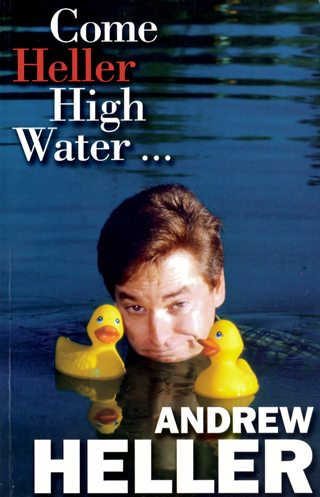
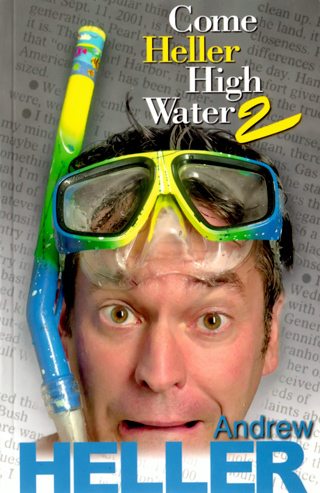
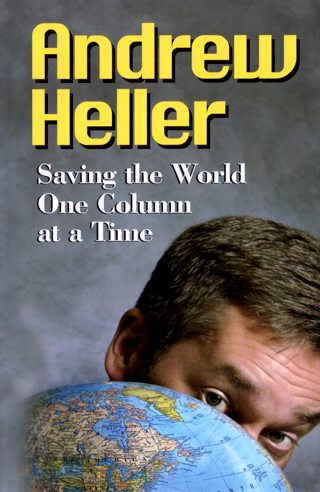
Pretty lengthy article, but I really enjoyed it. I do crossword puzzles all of the time, and like, Mary Jane pride myself in completing the New York Times ones including Sunday’s. Keep up the good work Mary Jane. Loved the article
Thank you, Sharon! Maybe we’ll see you at the tournament next year?
super story! It always impresses me to hear what someone has come up with to turn into a festival. My wife and I have started a tradition of taking a road trip every year to a new can-you-believe-this-is-a-festival. First one we went to was the Duck Tape Festival in Avon, OH, outside Cleveland http://www.ducktapefestival.com/. Breathtaking in color and creativity. This year we’re heading to Collinsville, IL for the Horseradish Festival. http://www.horseradishfestival.com/ We recently heard about the Potato Festival up in Munger, MI. http://mungerpotatofest.com/ But next year we’re heading to Berea, KY for the Spoon Bread Festival, maybe enter our recipe. https://www.facebook.com/SpoonbreadFestival Yep, so many fests, so little time…
I love that. Hope you make it to the Munger Potato Fest or the Linwood Pickle Festival one of these summers.
pickles…who knew…thank you…retirement security
isn’t it great?
Thanks, Tim. Horseradish festival? I’d be all over that!
Absolutely delightful! I felt like I was there too!
Thank you!
Awesome article, loved every word!
Thanks!
Last Testament Briefs will be on Countrywide Nonprofit Broadcasting twice Sunday morning. Don’t miss him.
Really enjoyed this. I never knew that such a tournament even existed!! Of course why not, if you can have a Hot Dog eating contest, or a cherry pit spiting event, why not something that actually uses your BRAIN. Good luck next year if you go.
Thanks, Marie. My brain *felt* like a hot dog by the end.
I loved your story. Thanks for the tile by tile scenario and personal asides. I loved it vertically and horizontally!
Thanks, Scott! And I loved your comment across and down!